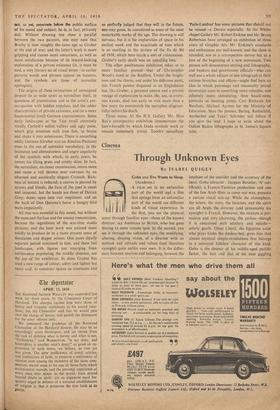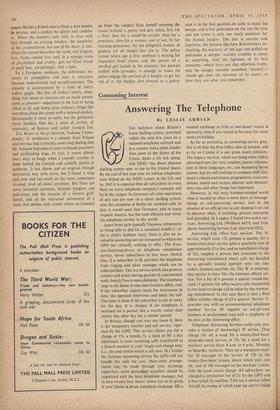Cinema
Through Unknown Eyes
By ISABEL QUIGLY Goha and Eve Wants to Sleep. (Academy.) A FILM set in an unfamiliar part of the world and a film that springs from an unfamiliar part of the world are different kinds of visual experience. In the first, you see the physical scene through familiar eyes—those of the known director, say American or British, who has gone filming to some remote spot. In the second, you see it through the unknown eyes, the modifying, altering, shaping vision, of a director with an outlook and attitude and values (and therefore eyesight) quite unlike your own. It is the differ- ence between tourism and belonging, between the intuition of the outsider and the accuracy of the local. Goha (director : Jacques Baratier; 'A' cer- tificate), a Franco-Tunisian production and one of the few Arab films to come our way, presents a certain visual mix-up. While the atmosphere, the actors, the story, the location, and the spirit are all Arab, the director (and presumably his eyesight) is French. However, the mixture is per- suasive and very charming, the pathos—though it is, concerned with adultery and suicide— utterly gentle. Omar Cherif, the Egyptian actor who plays Goha the donkey-boy, gives him that almost mystical simple-mindedness that belongs to a universal folklore character of this kind. Goha is the despair of his middle-aged prolific father, the butt and idol of his nine giggling sisters. He has a friend who is blind, a wise master he reveres, and a donkey he adores and confides in. When the master's wife falls in .love with him through an evening window, the simplicity of his circumstances, but not of his heart, is lost. When the rnasterdiscovers the truth, and forgives him, Goha cannot live; and, in a strange scene of playfulness and cruelty, gets his blind friend to push him, unrealisingly, into a lake.
To a European audience, the differences be- tween its atmosphere and ours is attractive because understressed and un-selfconscious. The comedy is accompanied by a kind of merry indoor giggle, like that of Goha's sisters, some- thing that seems to indicate not so much amuse- ment as pleasure—enjoyment in the fact of being about at all, and doing quite ordinary things like marching about the streets with a beloved donkey. Occasionally it turns to satire, but the gentleness never hardens. One has a sense of civility, of sensuality, of fantasy and rather tranquil fun.
Eve Wants to Sleep (director, Tadeusz Chmie- lewski; 'A' certificate) is a comedy from Poland and one has that (critically unnerving) feeling that Dr. Johnson had when it came to female preachers and performing dogs. In fact, it seems almost one's duty to laugh when a ,comedy reaches us from behind the Curtain and actually mocks at authority. It has charm and an original (though derivative) way with satire, but I found it long and slow and too much on the same, sometimes strained, level of comic invention. But there are some beautiful moments, between burglars and policemen and the inmates of a factory girls' hostel, and all the nocturnal adventures of a town that seethes with crooks where an innocent up from the country finds herself roaming the streets without a penny and gets taken, first for a thief, then for a would-be suicide, then for a prostitute, then for a maniac; and at last, by her rescuing policeman, for the delightful student of geodesy (of a41 things) that she is. The police station where she is first confined is waiting for inspection from above, and the person of a terrified girl locked in the armoury, her pockets stuffed with grenades, is enough to make the police engage the services of a burglar to get her out of it; the burglar then dressed as a police- man is in the best ppsition.on earth to make his escape, and a real policeman on the run for love and not crime is only too easily mistaken for the hunted burglar. The plot is circular and repetitive, the heroine (Barbara Kwiatowska) en- chanting, the mockery of red tape and puffed-up policemen a delight, scarcely credible it seems so surprising. And the lightness of its best moments—which have just that effortless frothi- ness we smugly consider somehow 'western'— almost get over the slowness of its worst : at least they are what you remember.















































 Previous page
Previous page